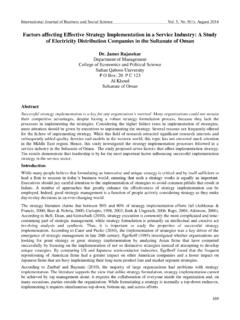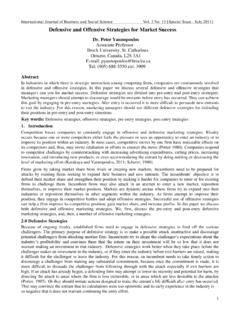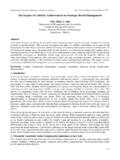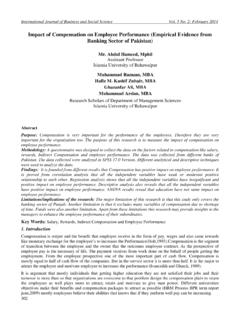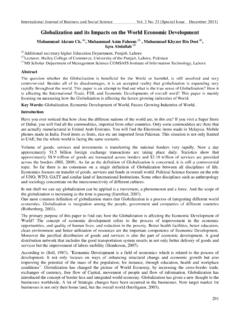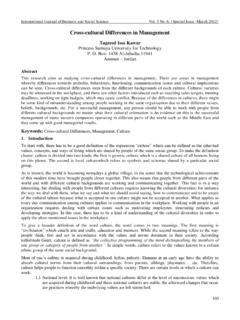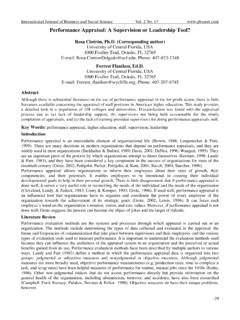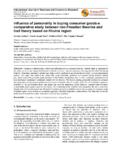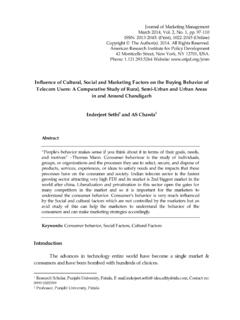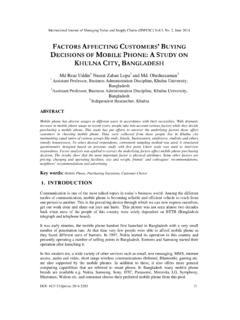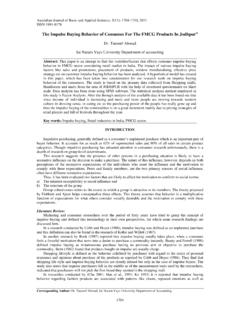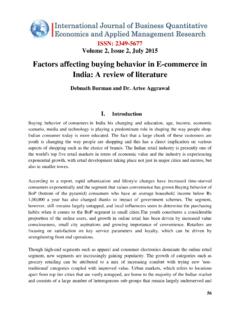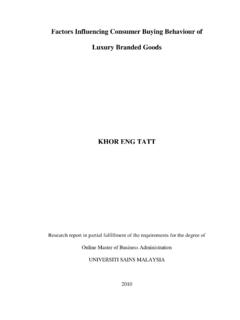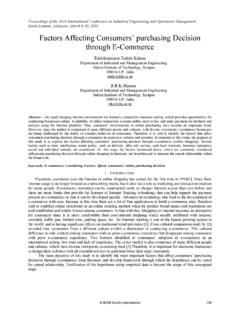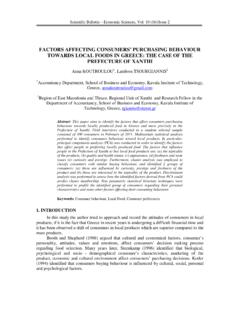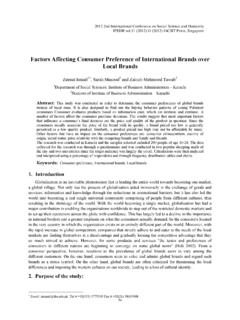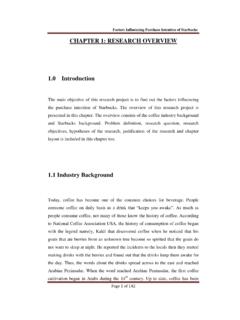Transcription of Factors Affecting Jordanian Consumers’ Adoption of Mobile ...
1 International Journal of Business and Social Science Vol. 2 No. 20; November 2011 96 Factors Affecting Jordanian Consumers Adoption of Mobile Banking Services Dr. Hamza Salim Khraim Chair of Marketing Department Middle East University, Box 383 Amman 11610 Jordan Dr. Younes Ellyan AL Shoubaki Chair of Accounting Department Middle East University, Box 383 Amman 11610 Jordan Dr. Aymen Salim Khraim Marketing Department Applied Science University Jordan Abstract Banking in several developing countries has transcended from a traditional brick-and mortar model of customers queuing for services in the banks to modern day banking where banks can be reached at any point for their services.
2 This can be attributed to the tremendous growth in Mobile penetration in many countries across the globe including Jordan. The current exploratory study is an attempt to identify the underlying Factors that affects Mobile banking Adoption in Jordan. Data for this study have been collected using a questionnaire containing 22 questions. Out of 450 questionnaires that have been distributed, 301 are returned ( ). In the survey, Factors that may affect Jordanian Mobile phone users' to adopt Mobile banking services were examined. The research findings suggested that all the six Factors ; self efficacy, trailability, compatibility, complexity, risk and relative advantage were statistically significant in influencing Mobile banking Adoption .
3 Keywords: Mobile marketing services, Banking services, consumer Adoption , Jordan 1. Introduction Banking today is undergoing a radical transformation. The symptoms are obvious; new products, new players, new channels are appearing daily. This transformation is taking place across all sectors of the banking industry. Technology is a major force in this radical transformation that led to breaking the geographical, legal and industrial barriers and has created new products and services. The escalation and convergence of wireless telecommunications has created a tremendous potential platform for providing business services.
4 It's estimated that Mobile phone users are approaching the three billion Mobile subscriptions mark globally, and advertisers and operators alike are keenly aware of the opportunity to connect with potential consumers through Mobile phones (Hibberd, 2007). The newly emerged service delivery channels and rapidly increasing penetration rates of Mobile phones are the motivators of this study. Technology has become an increasingly vital element in the competitive landscape of the financial services industry. Innovations in telecommunications have led to usage of Mobile devices in banking. Keen and Mackintosh (2001) showed that technological features play an important role in the Adoption of Mobile value added services.
5 In service use, Mobile phones are no longer used as they have typically been used before. Talking and text messaging (SMS) will remain, but extensive service use is expected to grow. These facts, in addition to the more personality of Mobile phones over PC s Internet and the range of computer-like functionality offered by top-of-the-range devices, are leading some observers to speculate that many people in the near future will start to see the Mobile phone as an alternative to PCs). The opportunity to use advanced technologies in service delivery have created challenges to developers of financial services; competitive advantage can be gained in form of costs reduction or customer satisfaction increase or lost investing in wrong technologies.
6 In order to rise to the challenges service providers are even more interested to enhance their understanding of consumer behavior patterns. Centre for Promoting Ideas, USA 97 Electronic banking, in its diversified forms, represents an innovation in which both intangible service and an innovative medium of service delivery employing high technology convergence. The term electronic banking defined by Daniel (1999) as the provision of information and services by a bank to its customers via electronic wired or wireless channels, for example Internet, telephone, Mobile phone or interactive television.
7 Moreover, rapidly changing technology has reshaped behavioral pattern how consumers interact with their financial institutions. Consumers are also more technologically savvy than ever, reducing their uneasiness involving technological innovation. The infusion of new technologies in the services sector is ubiquitous and continues to increase. Recently emerged wireless delivery channel using Mobile phones, Internet-enabled Mobile phones and PDAs for banking services is one step along that path. The starting point in investigating drivers and obstacles of Mobile banking Adoption is to give some insights into the Mobile technology development in recent years.
8 In Western Europe the presence of a common GSM standard and the high penetration rates of Mobile phones have raised the expectations in Mobile communication development. Mobile devices have become the fastest adopted consumer product to data (Dholakia et al. 2003). According to Forrester research group (2007), 219 million users will access the Internet via Mobile Phone. The use of Mobile phones for the implementation of electronic business transactions is additionally boosted by increasingly new technologies, such as wireless application protocol (WAP), Bluetooth, and technological developments are changed daily.
9 Mobile banking services or operations are still in their immaturity, leaving a great deal of room for development. There is a need, therefore, to understand users' acceptance and Adoption of Mobile banking and to identify the Factors Affecting their intentions to use Mobile banking. This information can assist developers in the building of Mobile banking systems that consumers want to use, or help them to discover why potential users avoid using the existing system. 2. Research Objectives Generally, this study attempts to study the Factors that affect the Adoption of Mobile banking services. The specific objective is: 1) To explore what Factors that may influence the Jordanian consumers Adoption of Mobile banking services, and 2.
10 Global Mobile Banking Mobile banking is used in many parts of the world with little or no infrastructure, especially remote and rural areas. This aspect of Mobile commerce is also popular in countries where most of their population is unbanked. In most of these places, banks can only be found in big cities, and customers have to travel hundreds of miles to the nearest bank. For example, In Iran, Guatemala and Mexico consumers can access Mobile banking with local Mobile network. In 2009, Zain launched their own Mobile money transfer business, known as ZAP, in Kenya and other African countries.
